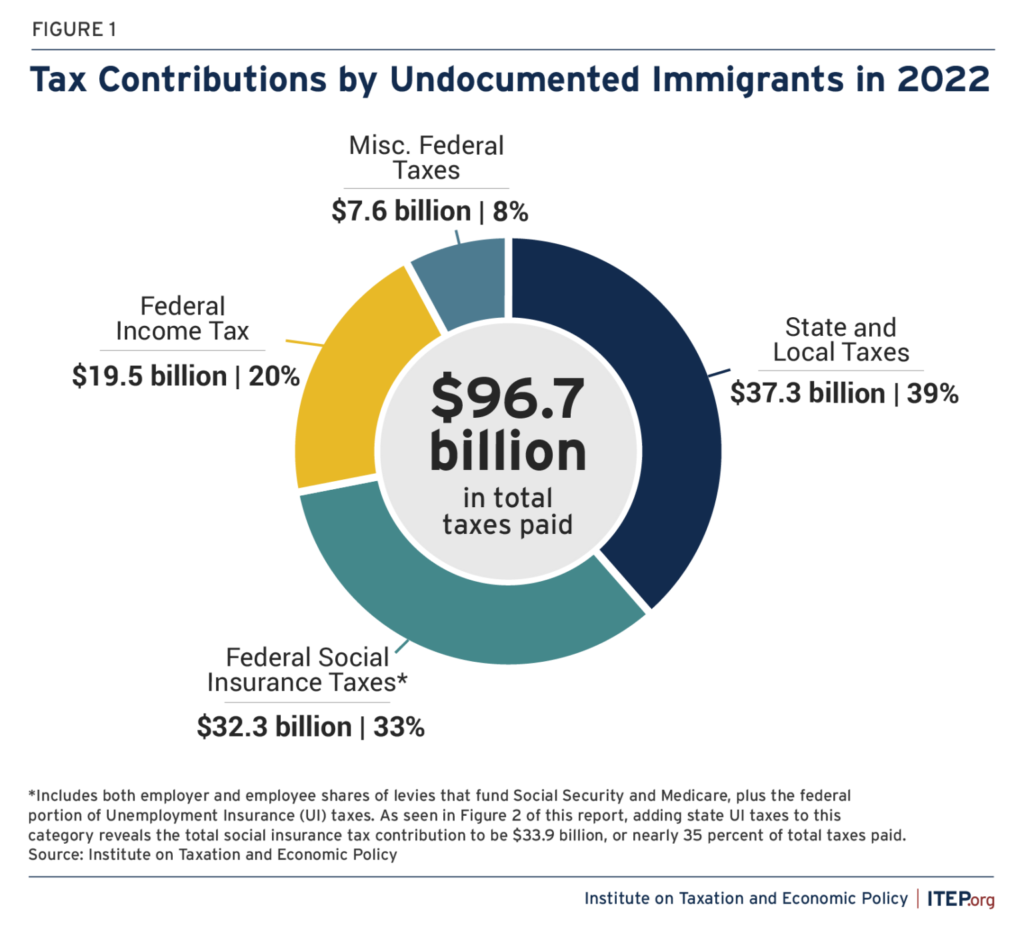It’s easy to blame those who are invisible to us, to make scapegoats of people we’ve never seen. But in truth, undocumented immigrants bear a quiet burden. They contribute to a system they may never benefit from. They work, they pay, and they receive next to nothing in return. They’re the invisible spine of an economy that depends on their labor while withholding its hand.
The argument that undocumented immigrants drain American resources is a mirage, a distortion of fact. In reality, they are the overlooked investors, paying billions into programs that hold them at arm’s length. They stand in line, but it’s a line that leads nowhere. And in that hard reality lies the uncomfortable truth: America is richer for their contributions, even if it refuses to see them.
In the vast landscape of America, where fields stretch as far as the eye can see, factories hum, and the cities never sleep, millions of people go unseen, blending into the fabric of everyday life. They build, they cook, they clean, they care for the elderly, they harvest our crops, and they tend to our children. They are the undocumented immigrants who are woven into the very economy they have come to fuel. Every year, they contribute billions in taxes—money that lines the coffers of federal, state, and local governments, funding programs and services that keep the wheels of this country turning. Yet, despite the immense contributions they make, they reap few of the benefits that these tax dollars help provide.

In 2022, undocumented immigrants in the United States paid an estimated $96.7 billion in taxes. This amount is staggering—a sum greater than the GDP of some small nations. From this figure, $59.4 billion went to the federal government, supporting programs that these workers are largely barred from accessing, including Social Security and Medicare. State and local governments received the remaining $37.3 billion, adding heft to budgets for public services.
The taxes they pay are as varied as the work they do. Through payroll deductions and other mechanisms, undocumented workers contributed $25.7 billion to Social Security and $6.4 billion to Medicare in 2022. But unlike American citizens, these immigrants cannot count on a safety net when they grow old or fall ill. Without a change in their immigration status, these contributions will never translate into benefits. Instead, they serve as a silent boon to programs struggling under the weight of an aging American workforce.
It is not a new story. In 2010, the Social Security Administration estimated that undocumented immigrants contributed approximately $12 billion to Social Security alone. These billions remain in the system, growing over time, an invisible gift from those who toil at the margins of society.
At the state and local levels, undocumented immigrants paid $15.1 billion in sales and excise taxes, $10.4 billion in property taxes, and $7 billion in personal and business income taxes. In many places, these contributions help pay for roads, schools, emergency services, and public safety. And yet, in most states, undocumented workers are ineligible for the assistance programs their taxes help fund.
In federal assistance programs, the story remains the same. Undocumented immigrants are shut out. Programs like Supplemental Security Income (SSI), Temporary Assistance for Needy Families (TANF), and food assistance programs such as the Supplemental Nutrition Assistance Program (SNAP) require lawful immigration status. These programs are built for those in need, but need does not recognize legal status. A worker who labors under the sun or in the cramped spaces of a factory feels hunger and hardship just the same. But federal law stands in the way, and so they endure in silence.
Some states and cities have recognized this imbalance, offering limited benefits. In a handful of places, undocumented immigrants can access prenatal care or, for the young among them, the opportunity to pursue higher education at in-state tuition rates. Such measures are, however, the exception rather than the rule. In the vast majority of places, undocumented immigrants live in the shadow of the public systems their taxes bolster.
Yet in times of emergency, America does extend a hand. Under the Emergency Medical Treatment and Active Labor Act (EMTALA), hospitals are required to treat anyone in need of emergency care, regardless of immigration status. Schools, too, open their doors to all children, giving them the chance to learn, to grow, and to dream. These instances are rare but meaningful reminders that the country has not entirely forgotten its promise of opportunity and justice for all.
These contributions and these sacrifices challenge the rhetoric that undocumented immigrants are taking resources from Americans. The numbers tell a different story. This community pours nearly a hundred billion dollars into the American system each year, contributing to services they will never enjoy. They are a testament to resilience, working not just for survival, but to build better futures for their families, often at a great personal cost.
This is not a burden on America. It is a profound gift. In a nation built by immigrants, they have done their part, and then some. These contributions deserve acknowledgment, and these workers deserve dignity. They are part of America’s strength, not its weakness. They are the silent supporters of systems that benefit every American, the hands that keep our economy moving forward, the people who embody the promise of hard work and sacrifice. And in the end, perhaps it is time to recognize their contributions as part of the American story, one that is neither loud nor showy but steady, honest, and quietly heroic.





No responses yet